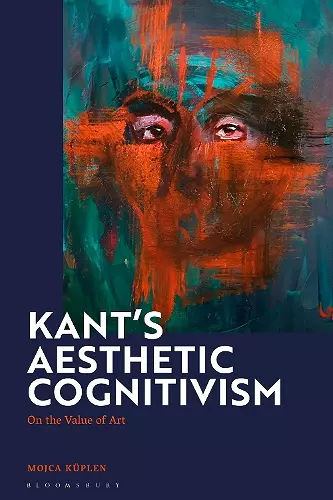Kant's Aesthetic Cognitivism
On the Value of Art
Format:Paperback
Publisher:Bloomsbury Publishing PLC
Published:23rd Jan '25
£28.99
Supplier delay - available to order, but may take longer than usual.

Revitalises Kant's aesthetic theory in light of cognitivist debates about the value of art and self-knowledge.
Mojca Kuplen connects 18th-century German aesthetics to contemporary theories of self-knowledge in order to highlight the unique cognitive value of art. She does this through revisiting Kant’s account of aesthetic ideas, and demonstrating how works of art can increase our understanding of abstract concepts whilst promoting self-knowledge.
Addressing some of the most fundamental questions in contemporary aesthetics and philosophy of art, this study covers the value and importance of art, the relationship between art and beauty, the role of knowledge in art and the criteria for artistic excellence. It offers an insight into problems related to the apprehension of meaning and the cognitive processing of abstract representations that have been of interest to contemporary cognitive science. Kant's Aesthetic Cognitivism presents these arguments in a lucid and wide-ranging engagement with the history of aesthetics and current academic debates to understand what art is and why it is valuable.
In this superb book, Kuplen offers an original interpretation of Kant that opens up a new way of thinking about the forms of worldly insight that art can offer. Kuplen’s model demonstrates that art’s claim to cognitive value lies in its ability to reveal features of the world in ways that cannot be grasped through the exercising of ordinary forms of cognition. Kuplen’s case for this is smart, clear, and of broad relevance. Kant’s Aesthetic Cognitivism is a major achievement. * John Gibson, Professor of Philosophy, University of Louisville, USA *
A thorough treatment of Kant’s understanding of artworks as expressions of aesthetic ideas is long overdue. Kuplen provides such an account, arguing that art enhances our holistic understanding of abstract concepts and ideas by leveraging the emotional and affective responses they elicit. Doing so, moreover, occasions aesthetic pleasure in art, suggesting an intimate connection between cognitive and aesthetic value at the core of Kant’s “aesthetic cognitivism.” Timely, and fully developed, Kuplen’s account is sure to further debate. * Diarmuid Costello, Professor of Philosophy, University of Warwick, UK *
ISBN: 9781350289550
Dimensions: 232mm x 152mm x 12mm
Weight: 320g
208 pages